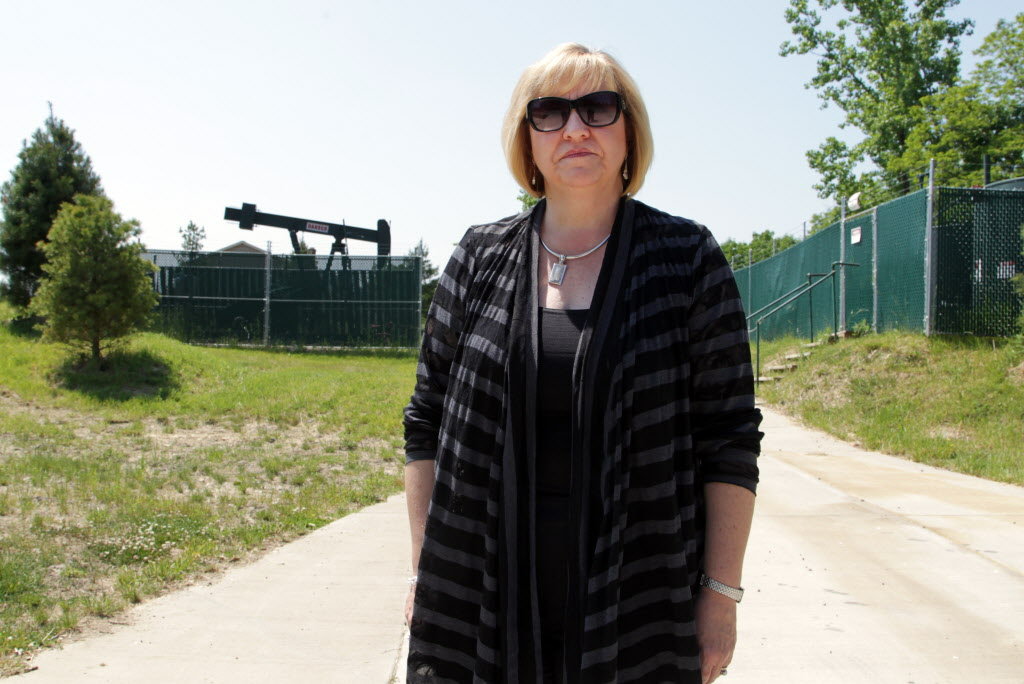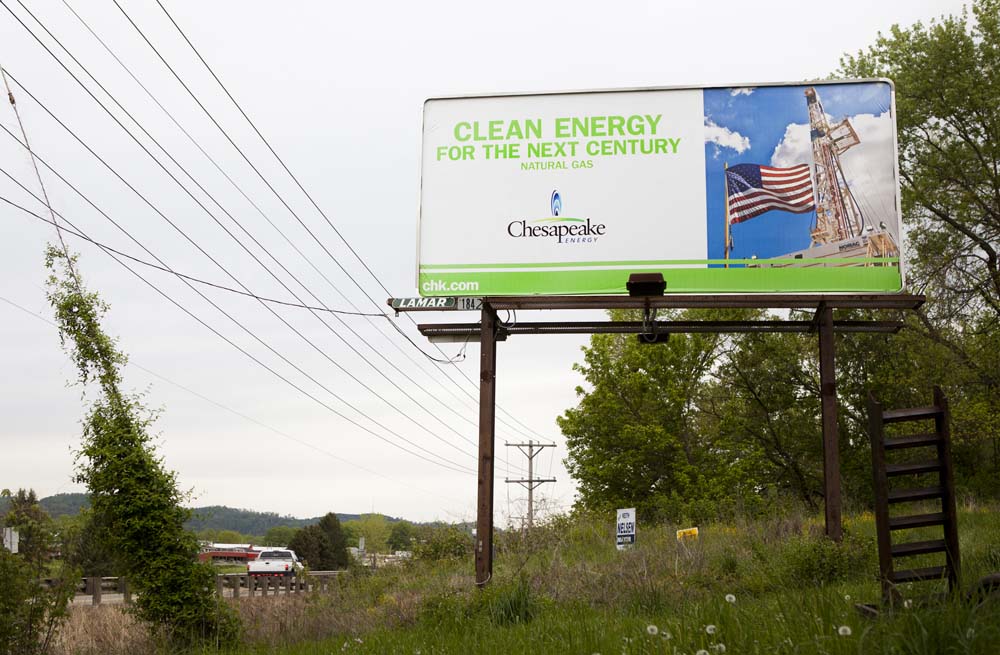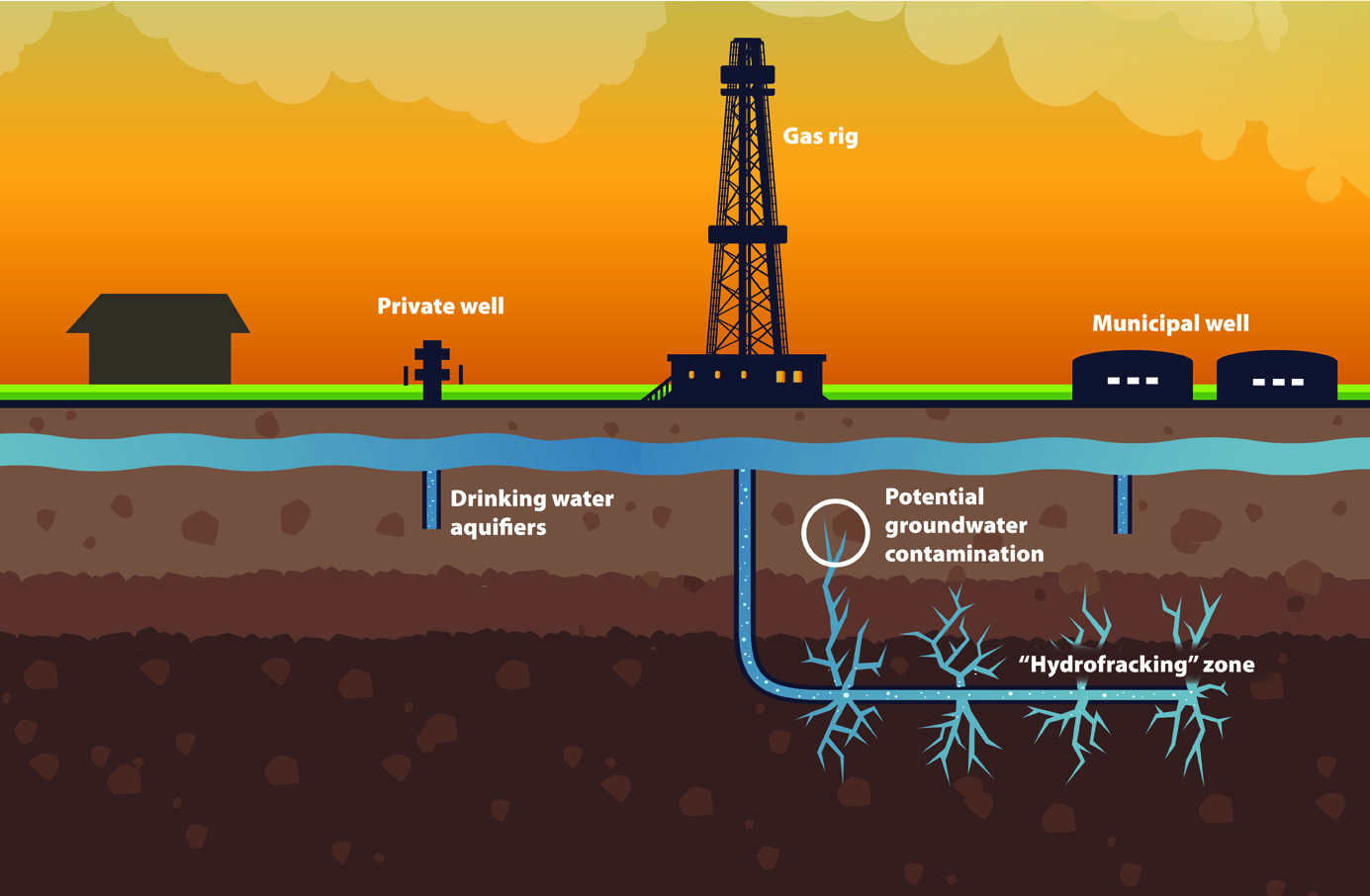
In the heart of the 2012 presidential election, critics of Republican nominee Mitt Romney claimed that, if elected, the newly minted president would unleash an intense fracking campaign — one that would rip through the nation’s suburbs and national parks, leaving a path of destruction along the way.
Romney wasn’t elected, yet the fears touted by his critics are unfolding in the heart of American suburban communities and national forests, and had been long before Romney hit the campaign trail.
The fracking industry has taken over the U.S., with more than 500,000 oil-producing wells located in rural and suburban land throughout the country in 2012.
Inside the boundaries of the suburban community of Broadview Heights, Ohio, eight oil companies are operating more than80 frack wells, most of which are within eyesight. The community is split between those who have leased their land to the oil industry, and the neighbors whose views have been invaded by oil wells.
The issue tearing the Ohio community apart is common in states sitting atop oil-rich formations, including the Marcellus Shale of Pennsylvania, New York, West Virginia and Ohio. With a goal of reaching energy independence by 2030, oil companies are unleashing crews throughout the formation.
“The industry has expanded into a lot of places where they weren’t before,” Amy Mall, senior analyst for the Natural Resources Defense Council, told Mint Press News in an April interview. “A lot more communities have been impacted in the last five or so years because of exploration of the shale oil and gas formations. There were a lot of communities that were not the target of that industry that are now.”
Broadview Heights — Pushing for Homeowners’ Rights
In 2012, Broadview Heights resident Susan Fowler was crafting an escape plan.
Years prior, her pleasant home and wooded backyard view underwent a few changes when the land bordering her property was leased to an oil company.
Several fracking wells were constructed within view of her home, starting in 2008 — a time when information related to domestic drilling was sparse.
The Ford design engineer claims that, shortly after well construction, her family began to show signs of illness — vomiting and headaches were commonplace. And so they made plans to leave, discovering through the process that the value of her home had dropped drastically — from $389,000 to $251,000.
“You couldn’t pay me to live in Ohio again,” she told The Plain Dealer. “It was our dream home. Now it’s a lovely home right on top of an industrial site. We feel like refugees from our city and our state.”
With more than 80 fracking wells throughout the community of 19,000, the scenario experienced by Fowler and her family is not uncommon.
“The trees are our saving grace right now,” resident Michelle Aini told Truthout, explaining they serve as a buffer to the view beyond.
The trees might do the trick for scenery, but a growing number of residents are now concerned the oil boom will to greater health issues.
Mothers Taking a Stand
A group of Ohio mothers formed a coalition to advocate against the widespread suburban fracking spread across the state.
Mothers Against Drilling In Our Neighborhoods (MADION), was created as an advocacy arm of concerned residents, monitoring the situation across the state and pushing for reform.
At the top of their list of causes is a homeowners’ bill of rights, drafted with the intent of providing homeowners living near oil wells a means to protect their land properties from market value decline and diminished water quality.
“Democracy is about the people creating the rules that we live by and these rules should not be forced upon us by legislators or corporations simply because they have more power or money,” it states on the organization’s website.
While other communities in frack-heavy states have chosen to push for moratoriums on the process altogether, it’s no longer an option for Ohio residents. In 2004, Gov. Bob Taft made a preemptive move, eliminating local governments’ right to restrict oil drilling within city limits.
No longer in office, Taft’s policies persist, to the delight of the oil industry.
Colorado and New York are now in the midst of the same battle Taft addressed nearly a decade ago. Facing growing discontent with the fracking industry in Colorado, Gov. John Hickenlooper in February claimed he wouldn’t tolerate local bans, claiming he’d go so far as to take the issue to court.
In May, a New York state appeals court ruled in favor of communities implementing bans on the fracking industry, giving a victory to those attempting to keep the industry from entering their communities.
Throughout the U.S., roughly 350 communities have taken action to halt fracking in their backyards. Yet even with moratoriums, as proved in New York and Colorado, the fight is never over. With the International Energy Agency claiming the U.S. will likely meet energy independence by 2030, oil companies with deep pockets know the stakes in the game are high.
Meanwhile, from Steve Horn's report Monday on DeSmogBlog:
On May 16, the Obama Interior Department announced its long-awaited rules governing hydraulic fracturing ("fracking") on federal lands.
As part of its 171-page document of rules, the U.S. Bureau of Land Management (BLM), part of the U.S. Dept. of Interior (DOI), revealed it will adopt the American Legislative Exchange Council (ALEC) model bill written by ExxonMobil for fracking chemical fluid disclosure on U.S. public lands.
ALEC is a 98-percent corporate-funded bill mill and "dating service" that brings predominantly Republican state legislators and corporate lobbyists together at meetings to craft and vote on "model bills" behind closed doors. Many of these bills end up snaking their way into statehouses and become law in what Bill Moyers referred to as "The United States of ALEC."
BLM will utilize an iteration of ALEC's "Disclosure of Hydraulic Fracturing Fluid Composition Act" - a bill The New York Times revealed was written by ExxonMobil - for chemical fluid disclosure of fracking on public lands and will do so by utilizing FracFocus.org's voluntary online chemical disclosure database.
In a way, it's all come full circle. The original chemical disclosure standards and the decision to utilize FracFocus' database came from the Obama Dept. of Energy's (DOE) industry-stacked Fracking Subcommittee formed in May 2011. DOE gave a $1.5 million grant to FracFocus.
The Texas state legislature soon thereafter adopted the first bill making FracFocus the fracking chemical disclosure database at the state level in June 2011. Since then, it's been off to the races, with the Council of State Governments adopting the Texas bill as model bill in August 2011, ALEC adopting it as a model bill in October 2011, and the bill becoming state law in Colorado, Pennsylvania and other states.
Both the Illinois and Florida state legislatures have also tried to push through this model, but it was dead in its tracks.
FracFocus has been an anemic and failed effort by the Obama administration to alter the George W. Bush administration's "Halliburton Loophole" standards for fracking chemical disclosure, which allowed the recipe of fracking chemicals to remain a "trade secret." It's amounted to nothing more than the same game by a different name, with a Harvard study recently giving FracFocus a "failing grade."
The FracFocus Façade: "Truck-Sized" Disclosure Loopholes
Almost two years after FracFocus' debut, it is important to scrutinize its disastrous performance.
"Drilling companies in Texas, the biggest oil-and-natural gas producing state, claimed similar exemptions about 19,000 times this year through August," explained Bloomberg in a December 2012 investigation. "Trade-secret exemptions block information on more than five ingredients for every well in Texas, undermining the statute’s purpose of informing people about chemicals that are hauled through their communities and injected thousands of feet beneath their homes and farms."
One representative from Texas - the original FracFocus state - said it allows "truck-sized" loopholes in chemical disclosure. An earlier investigative effort by Bloomberg explained just how big these 18-wheelers are.
"Energy companies failed to list more than two out of every five fracked wells in eight U.S. states from April 11, 2011, when FracFocus began operating, through the end of last year," wrote Bloomberg. "The gaps reveal shortcomings in the voluntary approach to transparency on the site, which has received funding from oil and gas trade groups and $1.5 million from the U.S. Department of Energy."
This moved U.S. Rep. Diane DeGette, author of the FRAC Act - which would mandate actual fracking chemical disclosure, although it's never garnered more than a handful of co-sponsors - to say FracFocus offers nothing more than the mirage of transparency.
"FracFocus is just a fig leaf for the industry to be able to say they’re doing something in terms of disclosure," she said.
"Fig leaf" is a generous way of putting it. After all, FracFocus is merely a PR front for the oil and gas industry.
FracFocus' domain is registered by Brothers & Company, a public relations firm whose clients include industry lobbying tour de force America’s Natural Gas Alliance (ANGA), Chesapeake Energy, and American Clean Skies Foundation - a front group for Chesapeake Energy.
ALEC Model Bill Gone U.S. Public Lands in BLM Rules
BLM's rules are a mirror image of the ALEC/ExxonMobil "model bill" for fracking chemical disclosure.
"The rule would require that disclosure of the chemicals used in the fracturing process be provided to the BLM after the fracturing operation is completed," BLM explains. "This information may be submitted to the BLM through an existing Web site known as FracFocus.org, already used by some states for reporting mandatory chemical disclosure of hydraulic fracturing chemicals."
Paralleling the BLM rules but less specific in what the online registry would be (it ended up becoming FracFocus), the ALEC/ExxonMobil model is a BLM rules clone.
"The {insert relevant state agency} by rule shall require an operator of a well on which a hydraulic fracturing treatment is performed to complete the form posted on the hydraulic fracturing chemical registry Internet website," the model bill reads.
This shall include both "the total volume of water used in the hydraulic fracturing treatment" and "the total volume of water used in the hydraulic fracturing treatment...as provided by a service company or chemical supplier or by the operator, if the operator provides its own chemical ingredients."
Obama Administration "Huddled" with Industry Before Rules Released
On April 12, EnergyWire's Mike Soraghan revealed that the Obama administration "huddled" with Big Oil before releasing BLM's final rules, watering them down to suit the industry's taste.
Heather Zichal, deputy assistant to the president for energy and climate change, "met more than 20 times in 2012 with industry groups and company executives lobbying on the proposed rule," according to Soraghan's review of White House visitor records. "Among them were the American Petroleum Institute (API) and the Independent Petroleum Association of America (IPAA), along with BP America Inc., Devon Energy Corp. and Exxon Mobil Corp."
"The rule really reflects who has had the most access and who is being listened to," Fran Hunt of the Sierra Club's "Beyond Gas" campaign told EnergyWire. "They've been following the road signs put up by industry."
Michael Brune, Executive Director of the Sierra Club, echoed these concerns.
"After reviewing the draft rules, we believe the administration is putting the American public’s health and well-being at risk, while continuing to give polluters a free ride," Brune stated of BLM's new fracking rules. "This proposal does not require drillers to disclose all chemicals being used for fracking and continues to allow trade-secret exemptions for the oil and gas industry."
3 WAYS TO SHOW YOUR SUPPORT
- Log in to post comments


















